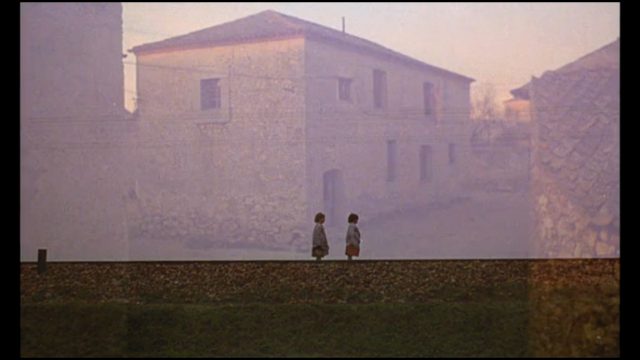(Originally published in the Sewanee Purple)
“It’s about the great mysteries of creation – life…and death.”
This quote comes from a dubbed version of Frankenstein that the characters watch in Spirit of the Beehive, but it applies just as well to Spirit itself. Those basic themes are constantly present in the film, as we follow a little girl named Ana and her initiation into the mysteries of mortality. We see her big sister Isabel use blood as lipstick, watch her stare at a poisonous mushroom or Isabel jumping over a bonfire, just a little too close to the flames. The Spirit sometimes appears as Frankenstein’s monster, who she had seen killing a little girl. When its mortal form is destroyed, she runs into the woods and disappears for hours. So much for life and death. But one of the greatest achievements in Victor Erice’s film is the way it captures the strange mysteries of the child’s world.
This is not the kind of kids’ movie we are used to seeing; there is no broad comedy, no villains, not really even much of a plot These are kids we may recognize from memory, but not from media. They are great actors because they never act, but say their lines as if they were everyday conversation. Shy and fidgety, they play themselves instead of their idea of what the director might want. A friend once told me of her son’s discovery that adults are silly, but kids are serious. I cannot think of any other movie that better captures the deadly seriousness of childhood. Spirit features a score of traditional children’s music, something ancient and mournful, a vision of childhood that goes past cliches to remind of what that time was really like. Spirit of the Beehive is full of ritual and magic, and invites the audience to come exploring in this strange new world along with Ana and Isabel.
If you’ve read about the film, you might have seen it described it as a movie about a girl who befriends a wounded soldier, or a girl who watches Frankenstein. The truth is that both of these things happen in Spirit, but it’s more accurate to say that it’s just about a girl. That was enough for me – this movie may be short on plot but it’s long on atmosphere. I’ve found it was helpful to think of the movie less in terms of story and more as what might happen if a master filmmaker had directed your old home movies. It is that poignant a slice of memory, and just about as unfiltered and wandering. Though Ana’s viewpoint colors the whole film, we never fully know what she is thinking, much less anyone else. Her parents are just as mysterious as life and death, the father tending beehives in a beekeeper suit shaped like a monk’s habit, and the mother writing letters to – her son? A lover? The truth is, it doesn’t matter. We see them from a knee-high perspective, taking us back to a time before we were allowed into the strange world of adults. Go see it if you loved Pan’s Labyrinth, or My Neighbor Totoro, or being a kid. It will take some patience, but you will be rewarded with one of the truest and most beautiful portraits of innocence ever put on film.


